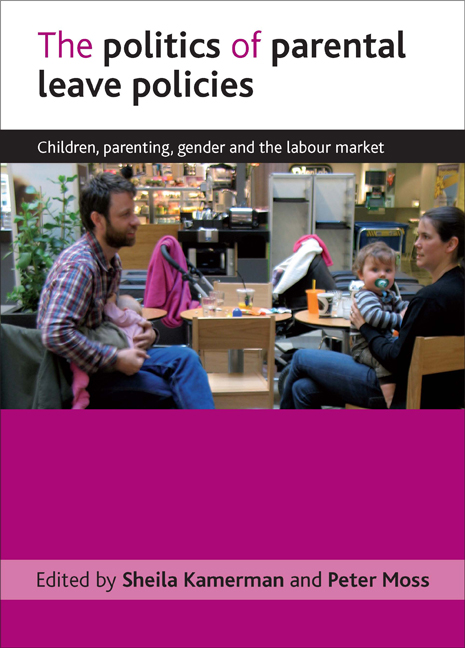Book contents
- Frontmatter
- Contents
- List of tables and figures
- Acknowledgements
- Notes on contributors
- one Introduction
- two Australia: the difficult birth of paid maternity leave
- three Canada and Québec: two policies, one country
- four Czech Republic: normative or choice-oriented system?
- five Estonia: halfway from the Soviet Union to the Nordic countries
- six Finland: negotiating tripartite compromises
- seven France: gender equality a pipe dream?
- eight Germany: taking a Nordic turn?
- nine Hungary and Slovenia: long leave or short?
- ten Iceland: from reluctance to fast-track engineering
- eleven The Netherlands: bridging labour and care
- twelve Norway: the making of the father’s quota
- thirteen Portugal and Spain: two pathways in Southern Europe
- fourteen Sweden: individualisation or free choice in parental leave?
- fifteen The European directive: making supra-national parental leave policy
- sixteen Conclusion
- Appendix
- Index
eleven - The Netherlands: bridging labour and care
Published online by Cambridge University Press: 05 July 2022
- Frontmatter
- Contents
- List of tables and figures
- Acknowledgements
- Notes on contributors
- one Introduction
- two Australia: the difficult birth of paid maternity leave
- three Canada and Québec: two policies, one country
- four Czech Republic: normative or choice-oriented system?
- five Estonia: halfway from the Soviet Union to the Nordic countries
- six Finland: negotiating tripartite compromises
- seven France: gender equality a pipe dream?
- eight Germany: taking a Nordic turn?
- nine Hungary and Slovenia: long leave or short?
- ten Iceland: from reluctance to fast-track engineering
- eleven The Netherlands: bridging labour and care
- twelve Norway: the making of the father’s quota
- thirteen Portugal and Spain: two pathways in Southern Europe
- fourteen Sweden: individualisation or free choice in parental leave?
- fifteen The European directive: making supra-national parental leave policy
- sixteen Conclusion
- Appendix
- Index
Summary
Maternity leave: 16 weeks, 6 weeks before the birth and 10 weeks after at 100% of earnings, up to a ceiling equivalent to the maximum daily payment for sickness benefit (€180).
Paternity leave: 2 working days at 100% of earnings, with no ceiling, paid by the employer.
Parental leave: from 1 January 2009, 26 times the number of working hours per week per parent per child; for example, a full-time job of 38 hours a week gives a leave entitlement of 988 hours. Paid, via a fiscal benefit, at 50% of the minimum wage (€1,356.60 per month for a full-time employee).
Leave to care for a sick child: twice the number of weekly working hours per year for parents of children living at home at 70% of earnings, paid by employer.
Other: the same conditions as leave to care for a sick child apply in the case of a sick partner or parent. There is also long-term compassionate leave for employees with a child, partner or parent with a life-threatening illness, which entitles employees to unpaid leave of up to 6 times their working hours per week, to be taken on a part-time basis. An employer can refuse short-term care leave (for a sick child, parent or partner) and long-term compassionate leave if the organisation's interests might be seriously harmed. In addition, for these leaves and paternity leave employers are permitted to deviate from the statutory entitlements by collective labour agreement or (under certain conditions) by written agreement with the works council or staff representatives. In these cases, employees can be offered more or less than the statutory entitlement (for example, less payment, a shorter leave or no right at all).
All employees who have completed one year's continuous employment with their present employer have the right to increase or decrease their working hours; this does not apply to employers with less than 10 employees, and an employer can refuse to grant the request if the interests of the organisation might be seriously harmed.
The Netherlands is a member state of the European Union (EU). It has the highest level of part-time employment among men and women of any member state in the EU or Organisation for Economic Co-operation and Development (OECD).
- Type
- Chapter
- Information
- The Politics of Parental Leave PoliciesChildren, Parenting, Gender and the Labour Market, pp. 175 - 190Publisher: Bristol University PressPrint publication year: 2009

